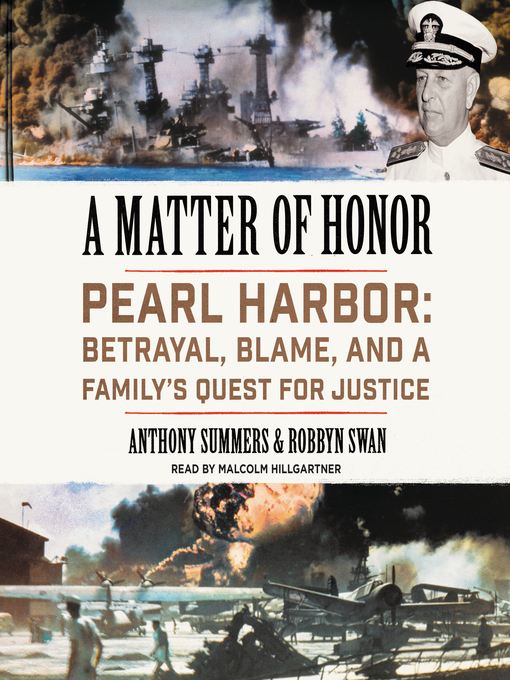
A Matter of Honor
Pearl Harbor: Betrayal, Blame, and a Family's Quest for Justice
فرمت کتاب
audiobook
تاریخ انتشار
2016
نویسنده
Malcolm Hillgartnerناشر
HarperAudioشابک
9780062564825
کتاب های مرتبط
- اطلاعات
- نقد و بررسی
- دیدگاه کاربران
نقد و بررسی

September 26, 2016
The married investigative team of Summers and Swann (The Eleventh Day) make an airtight case that Adm. Husband Kimmel, “the man with overall responsibility for America’s Pacific fleet” at the time of the attack on Pearl Harbor, should not have been blamed for the catastrophe. Through the extensive use of primary sources, including some previously unavailable materials from the National Archives, the authors delineate who in the U.S. government and military knew about Japan’s intentions in 1941. Tragically, there were dots that American intelligence did not properly connect that would have informed Kimmel of what was to come. But even had he gotten such an alert, the limited resources available to him—despite frequent requests, he lacked tools of defense such as a radar warning net—would have been insufficient. In the wake of the disaster, Kimmel was scapegoated and slandered without basis by people as eminent as then-senator Harry Truman. Eventually, a naval commission of inquiry found that Kimmel had not been derelict, but that exoneration came too late for his reputation. Even today, his grandchildren are fighting to have his rank posthumously restored to four-star admiral. This sad story reads like a thriller, thanks to the authors’ evocative prose and careful use of detail.

June 1, 2016
After the attack on Pearl Harbor, Adm. Husband Kimmel, commander in chief of the Pacific Fleet, was accused of dereliction of duty and relieved of his command. He defended his actions through eight investigations, and it appears that military and political officials had kept vital intelligence from him. His navy veteran sons, then his grandsons, have fought to clear his name, and in 2000, both houses of Congress voted to restore posthumously his four-star rank. Only a presidential signature is awaited. Here's the backstory, told by two award-winning journalists.
Copyright 2016 Library Journal, LLC Used with permission.

September 15, 2016
On December 7, 1941, Adm. Husband E. Kimmel commanded the Pacific Fleet. He stood in his office and watched the attack on Pearl Harbor destroy battleships, planes, and buildings--and the lives of more than 2,400 military personnel. When a spent bullet bounced off his chest, he muttered, "Too bad it didn't kill me." Within hours, the race to find someone to blame for the catastrophe was in effect. Kimmel became the subject of several Congressional inquiries and was demoted in disgrace. At the time, he insisted that he'd been denied crucial information and was being scapegoated by the U.S. Navy. He, his sons, and grandsons worked for years to clear the admiral's name, eventually gaining some measure of success but failing to have his rank restored. Pulitzer Prize finalists Summers and Swan (coauthors, The Eleventh Day) attempt to make sense of the decades-long saga of missed messages, faulty memories, long-classified documents, and official inertia--with some success. VERDICT Casting light on a controversial episode in history, this difficult yet important human interest story is likely to be of interest to large World War II collections. [See Prepub Alert, 5/2/16.]--Edwin Burgess, Kansas City, KS
Copyright 2016 Library Journal, LLC Used with permission.

June 1, 2016
After the attack on Pearl Harbor, Adm. Husband Kimmel, commander in chief of the Pacific Fleet, was accused of dereliction of duty and relieved of his command. He defended his actions through eight investigations, and it appears that military and political officials had kept vital intelligence from him. His navy veteran sons, then his grandsons, have fought to clear his name, and in 2000, both houses of Congress voted to restore posthumously his four-star rank. Only a presidential signature is awaited. Here's the backstory, told by two award-winning journalists.
Copyright 2016 Library Journal, LLC Used with permission.

September 15, 2016
This evenhanded expose of the scapegoating of the commander in chief of the Pacific fleet at the time of Pearl Harbor challenges official memory.Adm. Husband Kimmel was roundly blamed for the destruction of the fleet at Pearl Harbor and loss of 2,403 lives on that terrible day of Dec. 7, 1941, but as co-authors Summers and Swan (The Eleventh Day: The Full Story of 9/11, 2011, etc.) show, he was conveniently used to hiding many missteps by his Washington, D.C., superiors. Both Kimmel and the Army's Hawaiian commander, Lt. Gen. Walter Short, were forced into retirement after the debacle. The subsequent official fact-finding commission (the first of nine), the Roberts Report, blamed them for "dereliction of duty," and they were charged with having failed to "confer and cooperate" with warnings by Washington leading up to the surprise Japanese attack. Kimmel dedicated the rest of his life to challenging these charges and vindicating his name. The truth, as close as the authors can ascertain, is that the intercepts cracking a Japanese supercode were not adequately shared with Kimmel, although Washington officials assumed that they had been. The key middleman in this failure to pass on valuable intelligence information was Chief of Naval Operations Harold Stark, who was ostensibly Kimmel's longtime friend yet withheld critical information from him--e.g., the telltale Japanese dispatch of Sept. 24, which requested that Pearl Harbor be divided into special zones for the location of specific kinds of ships. Moreover, Kimmel was out of the loop in knowing about the deterioration of diplomatic negotiations between Japanese representatives and Washington in the final weeks leading to the attack, while the traffic analysts guessed that Japanese heavy carriers (which no one could locate) must be in home waters. In the end, the authors find enough blame, high and low, to go around. A solid demonstration of how an insistence on secrecy proved to be a fatal breakdown as the Japanese attack loomed. A good complement to Steve Twomey's Countdown to Pearl Harbor (2016).
COPYRIGHT(2016) Kirkus Reviews, ALL RIGHTS RESERVED.

























دیدگاه کاربران